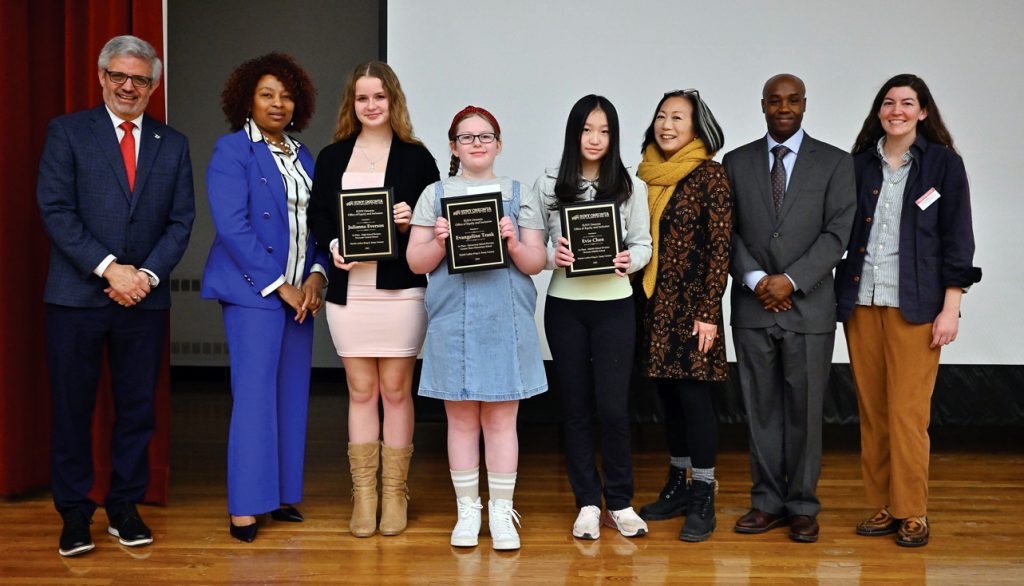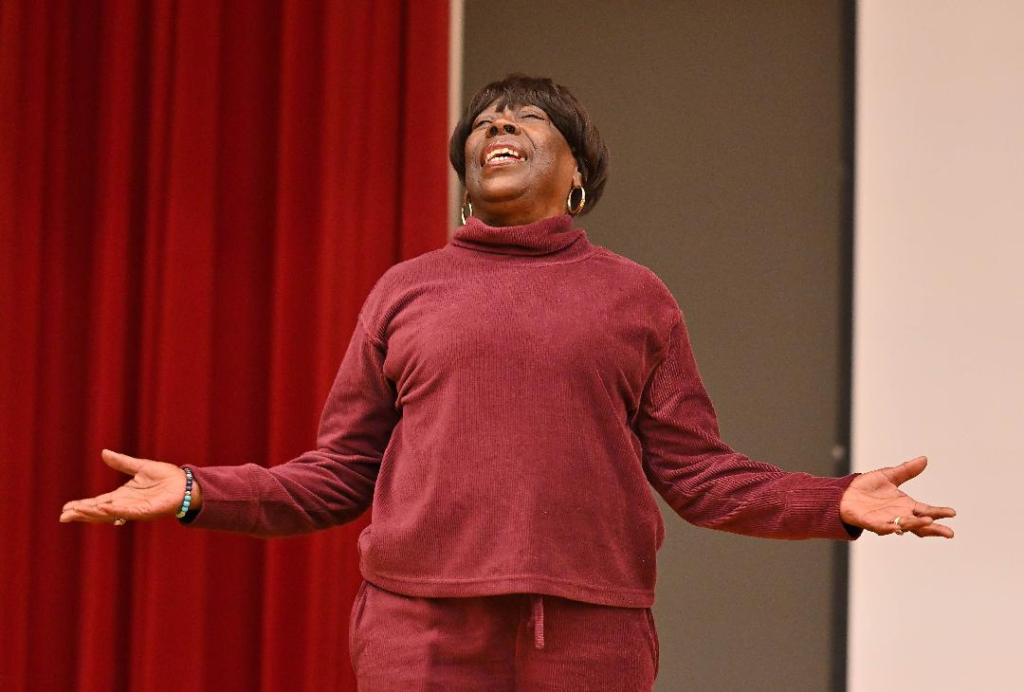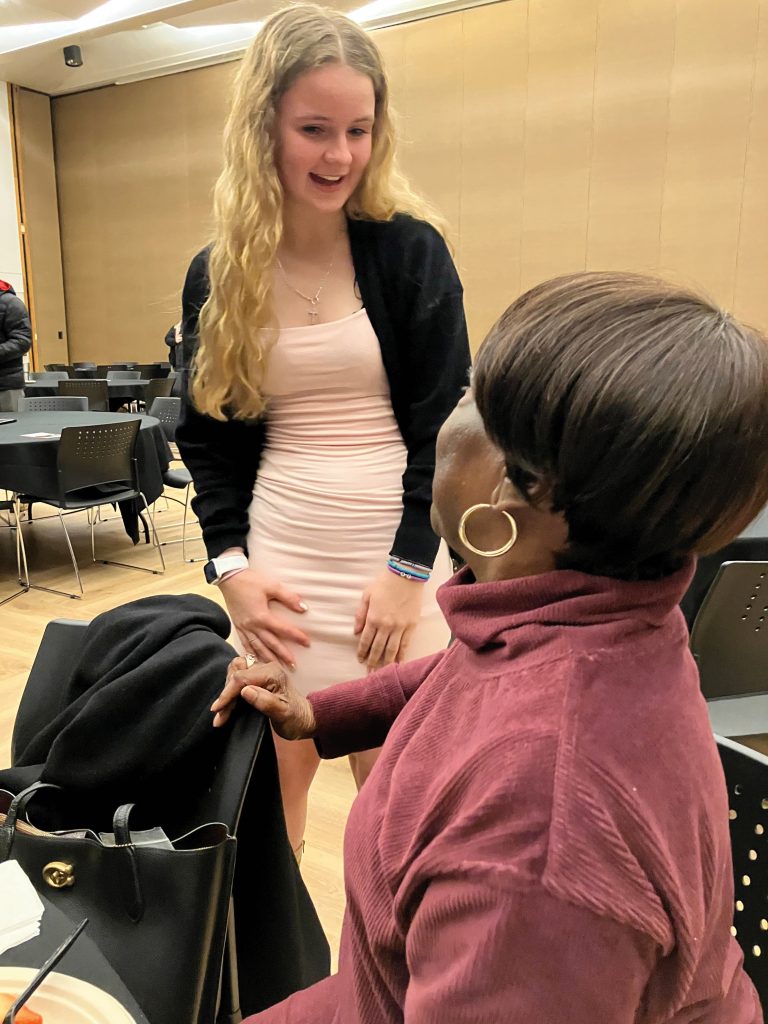
Iconic Civil Rights Voice Keynotes MLK Breakfast; Essay Winners Announced
By TERESA WINCHESTER
ONEONTA
The official 2025 Martin Luther King Jr. Day was on January 20—that date falling during SUNY Oneonta’s winter break. However, the revered civil rights leader was not to be forgotten. On Monday, January 27, King’s legacy was commemorated by a community breakfast held at Hunt Union on the SUNY Oneonta campus. The keynote address was given by singer and civil rights icon, Bettie Mae Fikes.
Fikes was born in Selma, Alabama in 1946 and is known as “the Voice of Selma” for her powerful singing as part of the Civil Rights Movement. On Monday, she spontaneously interspersed her unscripted talk with lyrics from gospel and protest songs and urged those present to “keep a song in your heart.”
Born into a family of gospel singers and preachers, Fikes sang her first church solo at age 4. She traveled with her parents’ vocal groups, the SB Gospel Singers and the Pilgrim Four. She performed at both the 1964 and 2004 Democratic National Conventions. In 2020, she sang at the funeral services for John Lewis, an early civil rights activist who later became a congressman from Georgia’s 5th district.

Fikes was known for replacing traditional lyrics of gospel songs with contemporary references. For instance, rather than singing, “This little light of mine, I’m going to let it shine,” she would sing, “Tell Jim Clark, I’m going to let it shine.” Jim Clark was the Selma sheriff from 1955 to 1966, ignominiously remembered for his brutal response to protesters seeking to march from Selma to Montgomery, Alabama’s capital, to advocate for voting rights.
Fikes’ deep roots in the Civil Rights Movement date from the 1960s. As a member of the Student Nonviolent Coordinating Committee, Fikes sat in at lunch counters, boycotted buses, registered voters, and led walkouts of her own R.B. Hudson High School—all to advocate for desegregation, voting rights, and social justice.
As a teenager, she was jailed in 1963 for her participation in a Selma protest. In 1965, she participated in a protest known iconically as “Bloody Sunday”—during which approximately 600 marchers were confronted by Sheriff Clark, Commanding Officer John Cloud and many others who had responded to Clark’s order for “all white men in Dallas County over the age of twenty-one to report to the courthouse to be deputized.” As the demonstrators were crossing the Edmund Pettus Bridge, troopers shoved them, knocking many to the ground, beat them with nightsticks and fired tear gas, while mounted troopers charged the crowd on horseback. A total of 17 people were hospitalized, with 50 receiving treatment for “lesser” injuries. It was in the course of this march that John Lewis suffered a skull fracture. Head scars from this encounter were visible for the rest of his life. Televised images of “Bloody Sunday” provided both Americans and international audiences with an eye-opening account of the brutal treatment of Blacks in the South and prompted wide support for both voting and civil rights. This year marks the 60th anniversary of “Bloody Sunday” and the Selma-to-Montgomery marches.
In her talk, Fikes described Clark as “the meanest sheriff in the world,” yet today, she counts his daughter Peggy as “one of my best friends.”
In regard to the current political climate, Fikes expressed both disappointment and hope.
“Everything we fought for has been taken away,” she said.
She then alluded to the Trump administration’s executive order to remove Air Force training courses featuring videos of the Tuskegee Airmen as well as of the Women Airforce Service Pilots in an effort to diminish the influence of diversity, equity and inclusion initiatives.
“Everything has been done by design, and we so easily fall into it,” she said.
Nevertheless, Fikes remains positive.
“You don’t have MLK or Malcom X April 1, 2025, but you still have a voice…I still believe that the best is still to come.”
Although often referred to as an “icon” of the Civil Rights Movement, Fikes does not actively seek the limelight, she confided in a private interview. When it comes to Selma and the movement in general, she is quick to point out that there were many “foot soldiers” contributing to progress in civil rights. In particular, she gives great credit to Selma’s “Courageous Eight.” It was these unsung heroes, Fikes said, who began the groundwork for the Selma-to-Montgomery March and who invited Martin Luther King Jr. to Selma. The eight individuals were the Rev. R. D. Reese, Ulysses Blackmon, Amelia Boynton-Robinson, Ernest Doyle, Marie Foster, James Gildersleeve, the Rev. J.D. Hunter, and the Rev. Henry Shannon.
“What we did, we didn’t do it for recognition,” she said.
Fikes also eschewed the limelight when she declined an invitation to appear on the Oprah Winfrey Show with the Freedom Riders, civil rights activists who brought attention to racial segregation in American interstate transportation in the early 1960s.
Fikes humorously recounted that, while Winfrey introduced the Freedom Riders by saying, “These people are the reason I’m here today,” the celebrity had no gifts to give them, despite often lavishing her audience with expensive gifts.
Fikes is likewise unimpressed by the 2014 film “Selma,” which depicts events of the Selma-to-Montgomery marches.
“It’s entertainment. It’s not accurate,” she said, referring again to the “Courageous Eight” who, in her opinion, did not receive adequate attention in the movie.
Wary of the invasion of technology into our daily lives, Fikes, who says she has never “googled” herself, feels that spirituality is the missing ingredient in modern life.
“Education by itself serves no purpose. We have mind and body, but the spirit has been left out. Spirit brings unity,” Fikes affirmed.

Also present at the breakfast were the three division winners of the MLK Jr. Essay Contest fostered by SUNY Oneonta’s Office of Equity and Inclusion. The entrants were asked to interpret the Martin Luther King Jr. quote: “We must learn to live together as brothers or perish together as fools.” They were then asked how people their age can bring unity and understanding to their communities.
According to Erin Francisco, assistant director of DEI Projects and Initiatives, there were 32 entries in all. Greater Plains Elementary School fifth-grader Evangeline Trask was the winner for the Elementary School Division. Evie Chen, an eighth-grader at Oneonta Middle School, took the prize for the Middle School Division, while Julianna Everson, ninth-grader at Worcester Central School, won the High School Division. Each student received a plaque and $100.00 in prize money.
In her essay, Trask wrote, “We can see that there are people who have no homes all over the town. To help, we could make fundraisers to buy shampoo, toothpaste, and other things so they can take care of themselves. We could bring community to our schools by having more group activities, like read-alouds, movies, board games, and more!”
With regard to King’s quote, Chen wrote, “If we don’t accept and work together, we are fools for letting color blind us from seeing we’re all one species.” She gave credit to King’s philosophy of non-violence, observing, “MLK demonstrated the impacts of nonviolent resistance and protests, proving that you don’t change people through asserting dominance but by changing the preconception embedded into their brains that whites are superior to Blacks just because they didn’t have to fight for their rights.”
In her essay, Everson wrote, “Individuals can build unity, empathy, and understanding within our schools and communities with King’s teachings by the inspiration of listening to his quotes or speeches…Most of King’s speeches and quotes were followed by a stand or protests. When King got his word across, he never once gave up or backed down; he kept going.”
Everson concluded by paying tribute to both King and her own mother as role models.
The winning essays are published in their entirety on AllOtsego.com.
The community breakfast was sponsored by the Office of Equity & Inclusion, Activities Council, the Capek Family Fund for Inclusive Excellence, University Advancement, and the Office of Alumni Engagement, all at SUNY Oneonta. Hartwick College’s Office of Diversity, Equity, Inclusion and Belonging was also a sponsor.

